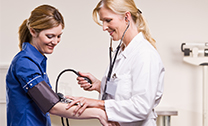One in 3 American adults have high blood pressure. High blood pressure increases your risk for serious health problems, including stroke and heart attack.
Get your blood pressure checked regularly starting at age 18 – and do your best to keep track of your blood pressure numbers.
How often do I need to get my blood pressure checked?
- If you are age 40 or older, or if you are at higher risk for high blood pressure, get your blood pressure checked once a year.
- If you are age 18 to 40 and you aren’t at higher risk for high blood pressure, get your blood pressure checked every 3 to 5 years.
What puts me at higher risk for high blood pressure?
Your risk for high blood pressure goes up as you get older. You are also at higher risk for high blood pressure if you:
- Are African American
- Are overweight or obese
- Have blood pressure higher than normal
- Don’t get enough physical activity
- Drink too much alcohol
- Don’t eat a healthy diet
- Have kidney failure, diabetes, or some types of heart disease
Learn more about your risk for high blood pressure.
What is blood pressure?
Blood pressure is how hard your blood pushes against the walls of your arteries when your heart pumps blood. Arteries are the tubes that carry blood away from your heart. Every time your heart beats, it pumps blood through your arteries to the rest of your body.
What is hypertension?
Hypertension (“hy-puhr-TEHN-shun”) is the medical term for high blood pressure. High blood pressure usually has no symptoms, so it’s sometimes called a “silent killer.” The only way to know if you have high blood pressure is to get tested.



